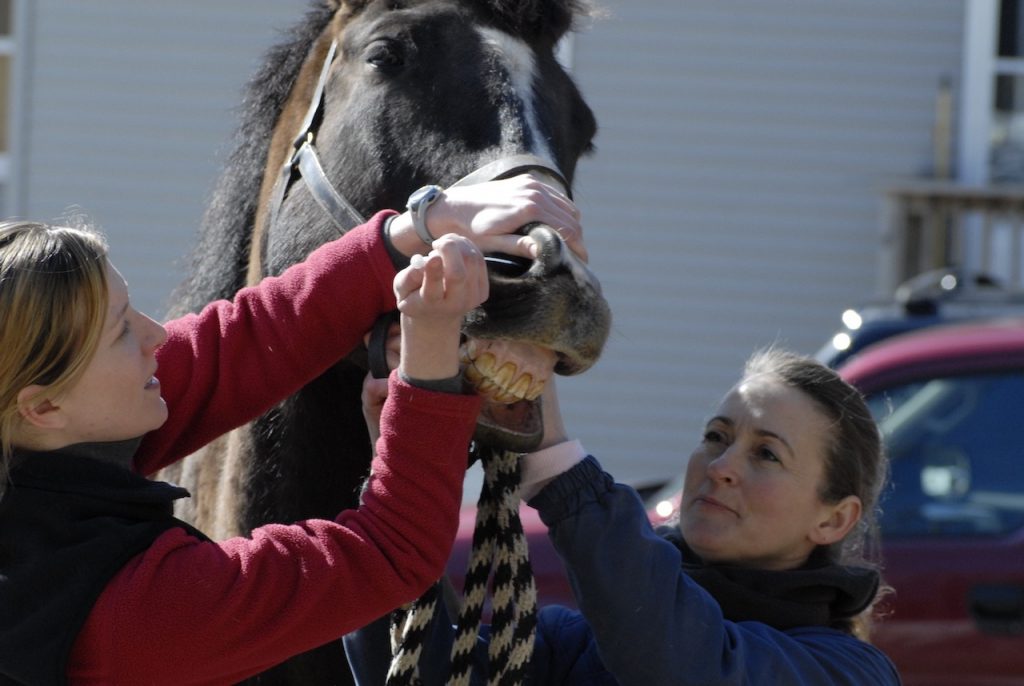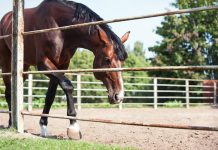
Here in New Zealand, we are very lucky that we don’t have many of the terrible diseases, such as rabies, that can affect horses in other countries. In some of these places, such as the USA, horses need a whole range of vaccinations so they – and in some cases their owners – are protected from horrific diseases.
It is perhaps because we don’t have so many diseases that sometimes, we in New Zealand can become a bit complacent with vaccination programmes for our horses. Tetanus is the main disease that we need to be vaccinating for – all horses and ponies should be vaccinated against tetanus. It is a life-threatening disease, and the vaccine is very effective in preventing it.
In this article, we will look at what exactly tetanus is, and how to vaccinate against it, then discuss the other equine vaccinations that are available in New Zealand.
The dreaded tetanus
Tetanus is a very serious disease caused by a bacteria called Clostridium tetani, which is commonly found in manure and soil. The bacteria gains entry into the body through wounds, foot abscesses, and sores in the mouth eg. erupting teeth. If the bacteria then finds itself in an area low in oxygen (we call this an anaerobic environment) – eg. a deep inside a puncture wound or inside the hoof capsule as in the case of a hoof abscess – it produces a toxin that affects nerves and cause the telltale clinical signs.
It can take five to 21 days for signs of the toxin to occur, so often the initial wound may have completely healed before the symptoms show. Humans are the most susceptible mammal to tetanus (and we need to make sure we too are immunised against it), and equines are the next most susceptible, so it is very important that our horses are protected.

A horrible death
Horses affected by tetanus initially appear stiff, reluctant to move, and have difficulty opening their mouth (lockjaw) and therefore trouble eating and drinking. The ears are often pricked up and forward, with the lips pulled back in a grimace. The neck and head then stretch out and the tail may be slightly elevated in a ‘sawhorse stance’.
As the disease progresses the horses are unable to swallow, so they will drool saliva and become very rapidly dehydrated. A noticeable sign is that the horse reacts excessively to sound, even clapping hands can make them go into rigid spasms, convulsions or fits.
Breathing becomes difficult as the muscles used are affected, and this leads to the horse becoming exhausted. Eventually it will collapse and die.
Treating tetanus
Treatment can be possible in very early and mild cases, but it is prolonged and therefore expensive. It involves a lot of intensive nursing care, with treatment of the wound, anti-toxin, antibiotics, sedation and painkillers. The horse must be kept in a very quiet environment for many months – often six months in a dark, quiet stable – before it may be turned out in a paddock, and at least a year before training/exercise may resume. Some horses may survive, but not return to normal performance. Advanced cases require euthanasia to prevent a very painful death.
What about prevention?
This disease may be prevented in two ways. Because the initial wound may be small and go unnoticed, vaccination is the recommended method.
Vaccination gives year-round protection and requires two injections a month apart, followed by a booster after a year. It is thought that after this booster there should be long-lasting immunity, with the next booster recommended after five years. However, cases have occurred in horses within this time span so yearly (or every two-yearly) boosters may be advised.
Annual vaccinations are commonly recommended and practiced – there is a better prognosis if a horse gets the disease if it has been vaccinated within the last year. As all animals are individuals, immunity wanes at different times after vaccination, so yearly boosters offers optimal protection for all. Discuss with your veterinarian the best programme for your horses.
Unvaccinated horses who are wounded may be treated with a short-acting ‘anti-toxin’ that will give protection for two to three weeks only. This is sometimes the only option, but is not ideal as:
- sometimes you may not notice small but deep puncture wounds, and
- the tetanus anti-toxin can work out costly if it has to be given repeated times a year
At the same time, any wounds need to be treated and managed appropriately to try and prevent the tetanus bacteria from establishing in the wound.
Broodmares and foals
Mares should receive their annual booster between one and two months before foaling, to ensure high antibody levels in their colostrum to protect the foal in the first two to three months of life. Foals from vaccinated mares may be vaccinated themselves from three months of age.
Foals from unvaccinated mares should be given tetanus anti-toxin at birth and then vaccinated from six weeks of age, although they will then need three vaccinations in the primary course.
Did you know? Should an unvaccinated horse be lucky enough to survive infection and recover from the disease, the horse will still need to be vaccinated once recovered.
Strangles
Vaccination against strangles is the next most common vaccine we use. It is recommended for horses who compete or take part in other activities away from home that involve mixing with other horses eg. hunting and trekking.
It is also recommended for horses who stay at home but still mix with other horses regularly coming and going from the property.
Strangles is a highly infectious bacterial respiratory disease in horses, caused by the bacterium Streptococcus equi var. equi. We get outbreaks of cases in New Zealand every so often. The signs of strangles are fever, nasal discharge and enlargement of lymph nodes, seen as swelling under the jaw.
The horse can become depressed and go off its food. A soft cough early in the disease process is common, due to the swelling around the throat. The swollen lymph nodes will eventually abscess, and burst after about seven to 14 days, discharging pus. The pus is highly infectious to other horses.
If you suspect your horses has strangles, please contact a vet, as proper precautions must be taken to ensure minimal spread of the disease. Isolate the horse immediately, and minimise the number of people who have access to him or her, ensuring any gear or clothing that comes in contact with the affected horse is disinfected before coming into contact with other animals.
Vaccination against strangles is not 100% effective, but it can decrease the incidence and severity of the disease. Options are:
- Intranasal vaccine: two administrations in the nostril two to three weeks apart with annual boosters.
- Intramuscular: three injections two weeks apart given in the muscle with annual boosters
- There is also an intramuscular vaccine which combines the tetanus and strangles vaccine in one injection, reducing the number of injections your horse will need.
- In cases of high risk of infection, then six-monthly boosters are recommended instead of annual boosters, as the immunity declines towards the end of the year following vaccination.

Broodmares and foals
Foals can start their vaccination course for strangles from three months of age. Broodmares should also be vaccinated, as they are likely to come into contact with other horses and also, importantly, so that some immunity will be transferred to their foals in colostrum. As with the tetanus booster, the broodmare should receive a strangles booster four to six weeks before foaling, to increase the level of strangles antibodies in her colostrum. The 2-in-1 (tetanus and strangles) booster can be used for this.
Other vaccinations in NZ
Vaccination against the following diseases may be recommended in certain situations, especially with broodmares and youngstock.
Equine herpes virus: Causes respiratory disease and abortion
Salmonella: Causes acute profuse diarrhoea often associated with stressful situations.
Rotavirus: A major infectious cause of diarrhoea in foals.
Please contact your veterinarian to discuss a vaccination programme for your horse(s)’s individual vaccine recommendations. Apart from tetanus, which all horse should be vaccinated for; the vaccines you will be advised to use will depend on how many horses there are on the property, the age groups that are present, what the horses are used for, whether horses are moving on and off the property eg. for competition or breeding, and some other factors.
This all has to be taken into account for a suitable programme to be developed.







